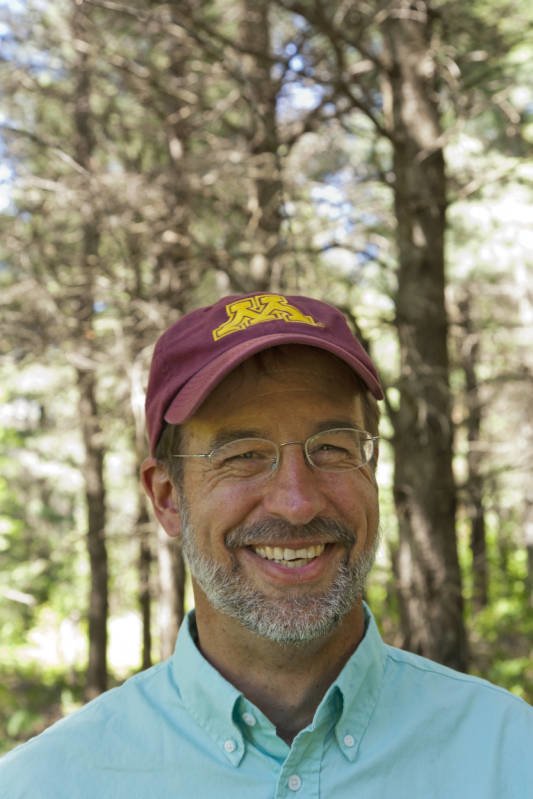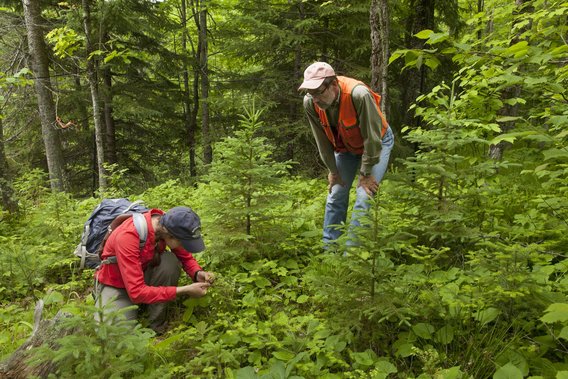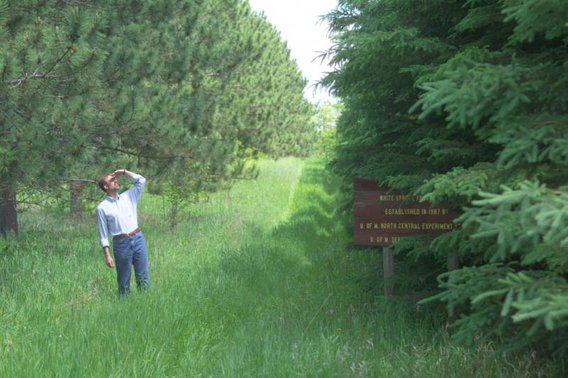
On April 30th, 2024, Andrew “Andy” David will retire from the University of Minnesota. Andy is an Associate Professor within the Department of Forest Resources at CFANS and current Director of Operations for the Cloquet Forestry Center (CFC) and the Hubachek Wilderness Research Center (HWRC). He joined the University of Minnesota in 1998 and became the interim Director of Operations for CFC/HWRC in November 2015 and Director of Operations in the summer of 2017. Andy is also the director of the Minnesota Tree Improvement Cooperative and has taught forestry and resource management classes throughout his time at the U of M. He has impacted hundreds of undergraduate and graduate students, faculty, staff, and community members in his different roles across the university.
In his retirement announcement to CFANS faculty and staff, Andy wrote, “I appreciate the opportunities I have been afforded as a faculty member in Forest Resources and as Director at the Cloquet Forestry Center and Hubachek Wilderness Research Center. The ability to work with a variety of faculty, students, staff, and stakeholders to identify problems, craft solutions and implement them has been one of the most rewarding parts of being at the University. As an ROC Director I have had the distinct pleasure of working with a talented group of people across the ROC system whose resilience and optimism is simply amazing.”
We would like to thank Andy for his time and accomplishments at the University of Minnesota, and we wish him the best in his retirement.

1. What was your favorite research project that you contributed to during your career?
That's like asking who is your favorite child. I've had a few but the latest ones always seem to rise to the top in a question like this. Right now I have two graduate students who will finish at the U in a few months after I officially retire. One of them is working on an eastern hemlock (Tsuga canadensis) restoration project. It's a very applied research project that will help us understand where planted eastern hemlock can thrive in Minnesota and how best to plant seedlings. Eastern hemlock is a state endangered species so this information informs future restoration efforts but also assists forest land managers that want a long-lived conifer that can tolerate warmer conditions. The second project is a very basic research project. This white spruce proteomics/metabolomics study takes advantage of a 110 family advanced second generation genetic trial that was created as part of our Minnesota Tree Improvement Cooperative's white spruce breeding program to search for compounds associated with exceptional growth. If there are protein or metabolite markers associated with exceptional growth they can be used to prescreen parents in seed orchards and seedlings before they are planted. This would be an enormous benefit to any organization that plants white spruce, the #2 planted species in the state.
2. What is your proudest achievement from your time with the UMN?
Honestly, what I am most proud of right now is a group effort. In February of 2023 President Gabel announced that the University would return the ancestral and reservation land that the Cloquet Forestry Center resides on back to the Fond du Lac Nation without preconditions. Within 11 months we had a signed MOU with FDL agreeing to that statement and outlining the details of how to move forward. Whether or not folks agreed with that decision a lot had to happen on both sides to get the MOU in place. I am impressed with how the University and the College marshalled personnel to work on the MOU but I am proudest of the way in which the staff and Cloquet and Hubachek handled themselves. It is not an understatement to say that every day they came to work wondering if they would have their jobs long-term. And yet day in and day out they continued on a path of excellence in their daily tasks and planned for the future as if nothing were different. Their demeanor and resilience in the face of adversity are simply remarkable.
3. Is there anything you'll miss from your time at the ROCs?
The people of course! For those who don't know about the Research and Outreach Centers, or are not involved with them, it can be difficult to understand that they play an integral part in the College's mission. I think of the ROCs as being less isolated than the main campus. Many of the ROCs have their own on-site researchers and instructors in addition to working with researchers and instructors from the main campus. But due to their location they are also closer to the public and so they see problems and solutions in a slightly different way than main campus does. The people who work at the ROCs are dedicated to making each location work for the University and the College.
4. Do you have any advice for others just starting their career?
Running a research program is a lot like running a small business. You have a product you are selling and hopefully people and organizations are interested in what you have to offer. You recruit undergraduate and graduate students like employees, manage a budget, decide what products you will offer and develop a marketing campaign. You are constantly judging the market, anticipating needs and finding ways to make what you do more effective while at the same time competing against other small 'businesses'.
5. What are you most looking forward to in retirement?
Additional time to be outside. Some of that will be on building projects, some on hiking trips and bike rides. There are several 25+ year old outbuildings at home from the previous owner that need to come down and be replaced by a single garden / storage shed. Then I will tackle a new garage. My wife, Jaci, can hardly wait. About 10 years ago I rediscovered the joy of self-movement that I experienced as a child and young adult. I really like to hike, especially if there are any vistas involved (trees!) although I am beyond the days when I could lug a 40 pound pack all day. And I find riding a bike, alone or with friends, to be rejuvenating.

